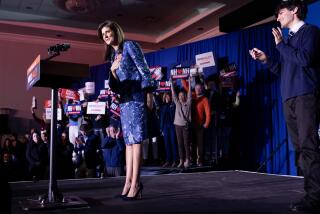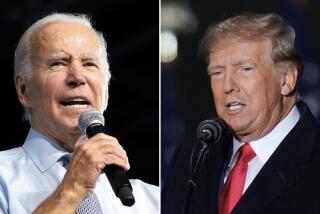POLITICS : Where Can a Landslide Be a Loss? Expectations, N.H.
- Share via
President Bush could win New Hampshire’s Republican primary on Feb. 18 and still end up being the loser. It all depends on what you expect.
“New Hampshire,” President Lyndon B. Johnson said in 1968, “is the only place where a candidate can claim 20% is a landslide, 40% is a mandate and 60% is unanimous.” Johnson knew from experience: that year, he received 50% of the votes in the Democratic primary. Minnesota Sen. Eugene J. McCarthy got 42%, but McCarthy’s better-than-expected finish was immediately and widely characterized as a defeat for the President and his Vietnam War policies. Soon after, Johnson called off his bid for reelection.
In 1972, Sen. Edmund Muskie of Maine scored a 46%-37% victory over Sen. George S. McGovern in the Democratic contest. But Muskie’s victory was narrower than the experts expected on his home New England turf, and McGovern got a big boost on the way toward the nomination.
Defining such expectations is a top preoccupation of political partisans and commentators. The predictions have great consequences for candidates, even before a vote is cast, because of their impact on media coverage and fund raising. “The expectations game is very real,” ABC News Political Director Hal Bruno said.
It is also hard to define. “It just happens by osmosis,” Bruno said.
Pundits rely on such things as returns from past elections, current polls and the opinions of other pundits. The ghosts of elections past are particularly evident: commentators are already pointing out Presidents Johnson, Gerald R. Ford and Jimmy Carter retired or lost office after they won less than two-thirds of the Granite State’s primary votes.
So, how big a percentage does Patrick J. Buchanan need to damage the President on Feb. 18? Assuming he does not win outright, what share meets the expectations? Can he get by with just 25%? Will 30% do it? Or 40%?
Opinions still range over a wide band. “I don’t think it’s calmed down yet,” said NBC News Elections Director Mary Klette, referring to the debate over what kind of showing Buchanan needs. CBS News political editor Dotty Lynch placed it “somewhere no lower than 25% and no higher than 49%”
Bush supporters are busy trying to raise expectations for his opponent, hoping that the magic number will end up being 40% or higher, thereby improving the odds that Buchanan will disappoint the experts. Former President Richard M. Nixon has put the number at 40%, for example. Democrats and Buchanan enthusiasts, hoping Bush will stumble, are pushing lower figures. Sen. Lloyd Bentsen (D-Tex.) put the damage-inflicting threshold at 25%.
Political writer Kevin Phillips, examining the spectrum of Buchanan scenarios in a recent edition of his American Political Report, said 20% to 25% would be the “lowest level at which Buchanan can retain credibility.” A 30% to 35% Buchanan showing, Phillips wrote, would be a “big embarrassment for Bush, but well short of the level needed for a fatal blow,” while 35% to 40% would be “the equivalent of McCarthy in 1968.” In other words, Bush, with a technical landslide of 20 to 25 percentage points, would suffer a debacle nonetheless.
There are plenty of critics of the expectations game. After all, there is no immutable law that says a less than stellar showing in a small state in February dooms a candidate to defeat in November. Unless, of course, all believe that to be true and act accordingly.
“It’s a lousy process,” Bruno said. “The voters don’t have anything to do with it.”
“I decry it, but I think we are going to have to live with it,” Klette said. “Many of the respected segments of the media can’t seem to cure themselves of this political virus, despite their good intentions.”
More to Read
Get the L.A. Times Politics newsletter
Deeply reported insights into legislation, politics and policy from Sacramento, Washington and beyond. In your inbox twice per week.
You may occasionally receive promotional content from the Los Angeles Times.










